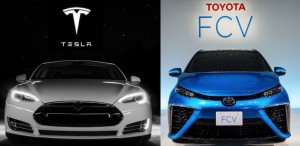 In case you’re in the market for a super-expensive, environmentally beneficial vehicle, Teslarati does a convenient side-by-side comparison of the Model S with the Toyota Mirai. The cars actually come out pretty even, with one glaring exception: the ease of fueling.
In case you’re in the market for a super-expensive, environmentally beneficial vehicle, Teslarati does a convenient side-by-side comparison of the Model S with the Toyota Mirai. The cars actually come out pretty even, with one glaring exception: the ease of fueling.
In our view, one of the major benefits of BEVs [battery electric vehicles] is that you refuel them at home, overnight, while you’re sleeping, so that your Model S is “full” every morning. Unless you travel long distances on a regular basis, you will rarely need a Tesla Supercharger or any other refueling source away from home. That’s huge, and often get’s lost in the discussion of “range anxiety” that always seems to invade the thinking of those who don’t own a Model S. Although fuel cells are sexy, it seems odd to us that Toyota has returned to a 20th century fueling station paradigm. In essence, there is little difference between refueling a Mirai and refueling a Camry. Sure, the fuel is different, but you have to hunt for a specific refueling station as your Mirai slowly depletes its hydrogen. No charging at home—ever.
Not to mention that the hydrogen can be energy-intensive to generate and may not come from clean sources. As I’ve written before, there are big question marks about the long-term environmental benefits of investing in hydrogen fueling. It may be necessary for some big cargo trucks that can’t otherwise be powered efficiently by batteries, but we shouldn’t look to it as a panacea for passenger vehicles.
Either way, we’ll need the prices on both vehicles to come down significantly in order to make a dent in our transportation emissions.


